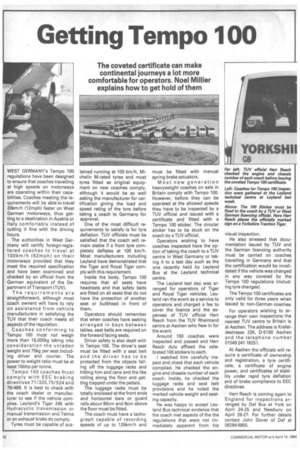Getting Tempo 100
Page 34

If you've noticed an error in this article please click here to report it so we can fix it.
The coveted certificate can make continental journeys a lot more comfortable for operators. Noel Millier explains how to get hold of them
WEST GERMANY's Tempo 100 regulations have been designed to ensure that coaches travelling at high speeds on motorways are operating within their capabilities. Coaches meeting the requirements will be able to travel 20km/h (12mph) faster on West German motorways, thus getting to a destination in Austria or Italy comfortably instead of cutting it fine with the driving hours.
The authorities in West Germany will certify foreign-registered coaches to travel at 100km/h (62mph) on their motorways provided that they meet the required specification and have been examined and checked by an official from the German equivalent of the Department of Transport (TUV).
The requirements are straightforward, although most coach owners will have to rely on assistance from vehicle manufacturers in satisfying the TUV that their coach meets all aspects of the regulation.
Coaches conforming to Tempo 100 must not weigh more than 16,000kg taking into consideration the unladen weight and 75kg per seat including driver and courier, The power to weight ratio must be at least 15bhp per tonne.
Tern po 100 coaches Must comply with EEC braking directives 71/320,75/524 and 79/489. It is best to check with the coach dealer or manufacturer to see if the vehicle complies. Leyland's Tiger 245 with Hydracyclic transmission or manual transmission and 'Telma or an exhaust brake do comply.
Tyres must be capable of sus
tained running at 100 km/h. Michelin M-rated tyres and most tyres fitted as original equipment on new coaches comply, although it would be as well asking the manufacturer for certification giving the load and speed rating of the tyre before taking a coach to Germany for approval.
One of the most difficult requirements to satisfy is for tyre deflation. TUV officials must be satisfied that the coach will remain stable if a front tyre completely deflates at 100 km/h. Most manufacturers including Leyland have demonstrated that the Tiger and Royal Tiger comply with this requirement.
Inside the body, Tempo 100 requires that all seats have headrests and that safety belts are fitted on all seats that do not have the protection of another seat or bulkhead in front of them.
Operators should remember that when coaches have seating arranged in bays between tables, seat belts are required on the forward facing seats.
Driver safety is also dealt with in Tempo 100. The driver's seat must be fitted with a seat belt and the driver has to be protected from the objects falling off the luggage racks and hitting him and cans and the like rolling along the floor and getting trapped under the pedals.
The luggage racks must be totally enclosed at the front ends and horizontal bars or guard rails about 80cm and 8cm above the floor must be fitted.
The coach must have a tachograph capable of recording speeds of up to 125km/h and must be fitted with manual spring brake actuators.
Most new generation heavyweight coaches on sale in Britain comply with Tempo 100. However, before they can be operated at the allowed speeds they have to be inspected by a TUV official and issued with a certificate and fitted with a Tempo 100 sticker. The circular sticker has to be stuck on the coach by a TUV official, Operators wishing to have coaches inspected have the option of taking the coach to a TUV centre in West Germany or taking it to a test day such as the one recently held by Leyland Bus at the Leyland technical centre.
The Leyland test day was arranged for operators of Tiger and Royal Tiger vehicles. Leyland ran the event as a service to operators and charged a fee to cover the licence and the expenses of TUV official Herr Resch from the TUV Rheinland centre at Aachen who flew in for the event.
Around 100 coaches were inspected and passed and Herr Resch duly affixed the celebrated 100 stickers to each.
I watched him carefully inspect and check that each vehicle complied. He checked the engine and chassis number of each coach. Inside, he checked the luggage racks and seat belt provisions and he noted the marked vehicle weight and seating capacity.
He was happy to accept Leyland Bus technical evidence that the coach met aspects of the the regulations that were not immediately apparent from his visual inspection.
He also stressed that documentation issued by TUV and the German licencing authority must be carried on coaches travelling in Germany and that the certification would be invalidated if the vehicle was changed in any way covered by the Tempo 100 regulations (including tyre changes).
The Tempo 100 certificates are only valid for three years when issued to non-German coaches.
For operators wishing to arrange their own inspections the nearest TUV centre to Britain is at Aachen. The address is Krefeldestrasse 225, D-5100 Aachen and the telephone number 01049 241 18251.
At Aachen the officials will require a certificate of ownership and registration, a tyre certificate, a certificate of engine power, and certificates of stability under rapid tyre deflation and of brake compliance to EEC directives.
Herr Resch is coming again to England for inspections arranged by Daf Bus at York on April 24-25 and Newbury on April 26-27. For further details contact John Dover of Dal at 06284 6955.




























































































